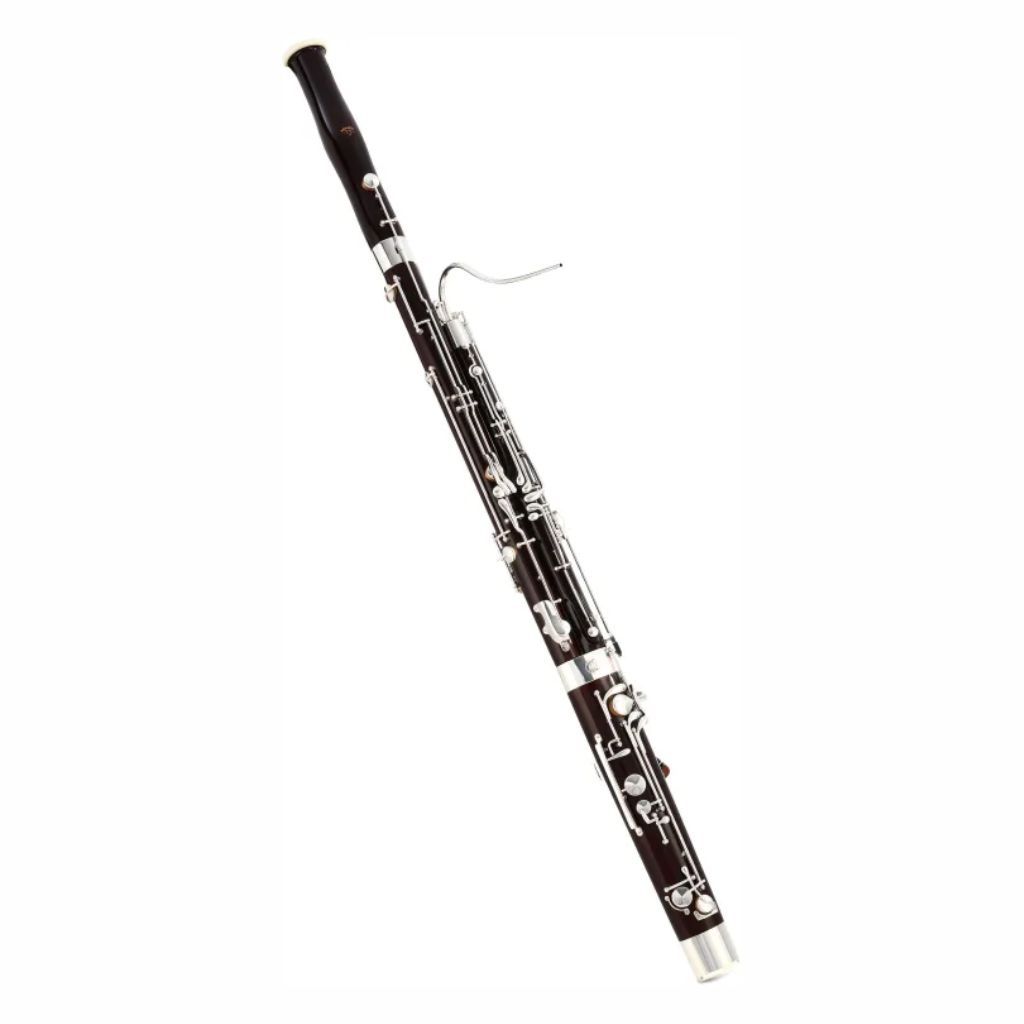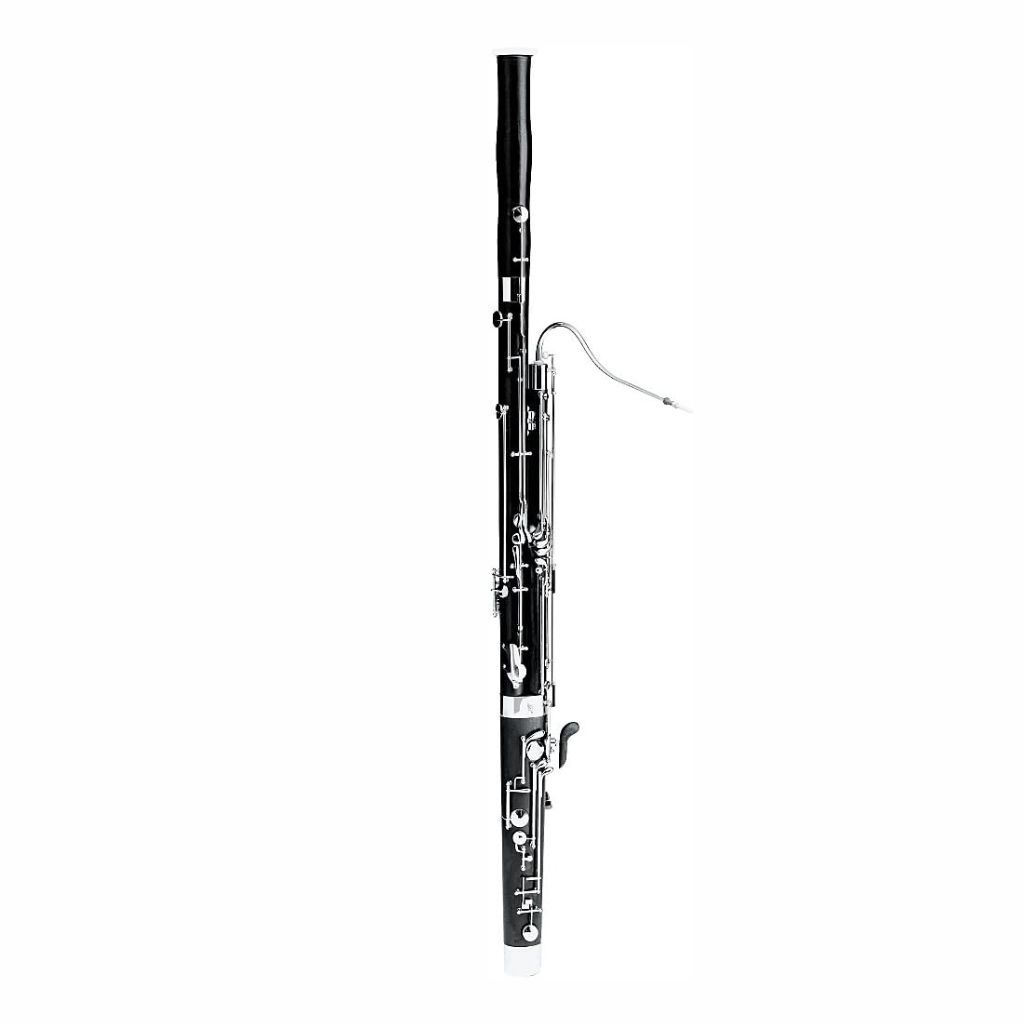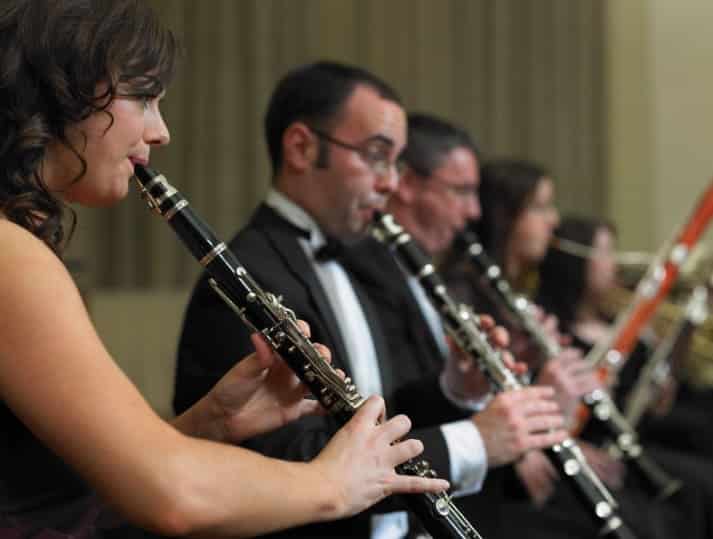Little and often
ONE
Instead of squeezing all practice into one long go, spread it over many short sessions in a week. Surprise awaits, seeing just how much can be done in mere moments with some real focus! Playing a few times weekly, even for a few minutes, boosts ‘muscle memory’ in fingers and mouth faster. Each time, it gets just a tad smoother.
Focus on the basics
TWO
It’s easy to fall into the trap of thinking that practice is all about learning to move your fingers in the right order to play the notes, but never forget that no notes at all will happen if we don’t blow into the instrument properly!
Whether you’re a true beginner or just started playing bassoon or a seasoned professional, for all young bassoonists it’s worth dedicating some practice time to basic skills like holding long notes, changing dynamics and practising quick tonguing – you’ll find uses for all of these things once you move on to playing your pieces.
Pay attention to posture
THREE
Yes, it’s big, it’s heavy and it can quickly become uncomfortable if you’re not supporting it properly. Each time you play, take some time in the beginning to make sure you’re as comfortable as can be,
using your right leg or hip to support the instrument so there’s not too much weight on your left hand.
Remember that lots of things on the bassoon are adjustable, so you might need to change the tension of your harness, twist your reed or move your crook so that your reed comes straight into your mouth with no need to turn your head. The bassoon also has a habit of getting in the way when you’re trying to read music, so make sure you’ve put the music stand somewhere you can actually see it properly!

Make friends with your reeds
FOUR
Two and a half metres of tubing, at least 22 keys… and there’s no music at all without the little reed on the end! Always make sure you’ve got a spare reed – that one you’re super-happy with is bound to break or stop working just when you’re about to play a concert or exam (such is the way of the world…)
Give them a bit of attention and they’ll be kind to you (hopefully…) Keep your reeds in a proper reed case to avoid damage, and try to rotate between at least two, as this will help to prolong their life and mean that you’ve got a backup you’re happy with if the worst happens.
Don’t skimp on the accessories
FIVE
Yes, bassoons are expensive – but there’s no point investing all that money if you’re not going to be comfortable. Little extras like a suitable harness/seat strap, a well-made reed, a water pot (to soak your bassoon reeds in) and a lightweight rucksack case can all make a real difference to your bassoon playing experience, so try to find just a bit more budget for these bits.
GO ONLINE
SIX
The bassoon is a fairly rare instrument (in some places it’s referred to as an ‘endangered species’) so it’s quite possible that you’ll be one of only a few players in your school or area – or maybe even the only one.
So who do you turn to for a chat about your lovely shiny instrument – its wonderful possibilities and its little, shall we say, quirks?

Luckily there’s loads of advice and inspiration online these days – have a look around and you’ll find all sorts of forums, videos and events where you can pick up tips to improve your playing, meet other old and young bassoonists and dream up new ideas of pieces you might like to play.
Play with other people
SEVEN

As much as we love our instrument, most students or bassoon players will admit it’s not at its best when played alone. We want to play with other people! Whatever stage you’re at with your playing, try to get involved in playing with other people as much as you can – it might be joining the band directors or an ensemble, playing duets with a neighbor, young bassoonists, or staging mini-concerts with a string-playing sibling.
Any and all of these things help you to build up skills like tuning and counting, which can be difficult to focus on alone. And more importantly, started playing bassoon with others is fun (and we all need a bit more of that in our lives…!)
Listen to bassoon music
EIGHT
Instruments like the bassoon have a lot of pieces written in all kinds of styles, and if you’re lucky, you’ll get an amazing solo in an orchestral piece. There are some videos on YouTube that you can explore – just type in “bassoon solo”. It’s really fun to be able to spot the bassoon in pieces of music or just have a piece in mind that you would like to learn one day.
Technique
NINE
For every bassoonist, technique is the foundation of the playing. Imagine it like a house – if it didn’t have foundations it would be VERY wobbly.
There are a few things you can do to improve your technique – long notes (builds up good strong lungs), scales & arpeggios (helps your fingers become lovely and flexible and helps you to recognise scaly patterns in pieces), finger wiggles – literally wiggling between notes (makes your fingers work well together, even those awkward ones which don’t want to behave). If you start and end a practice session with these then you will have strong and very non-wobbly foundations in no time.

Enjoy your instrument
TEN
Most of all, enjoy your instrument. Playing music is one of life’s great joys and will bring a lot of happiness to you and anyone you play to. Make sure that you play something you really love every time you practice and maybe even sometimes treat your family and friends to a mini-concert.
Do you want to share this infographic on your site? Use this code...
HIGHLY RECOMMENDED BASSOONS
Heckel Bassoon
The Heckel Bassoon is renowned for its exceptional craftsmanship and rich, resonant tone, making it a preferred choice for professional bassoonists worldwide.
Its precise intonation and responsive playability ensure a superior performance in both solo and ensemble settings.
Heckel Bassoon

FEATURES: -Made from the highest quality woods
-Fully customizable, with options for tone hole placement, keywork, and other specifications
-Offers a rich, complex tone and exceptional projection
- Handmade by skilled craftsmen in Germany
- Unique and tailored to the specific needs and preferences of every musician
- Custom-made and therefore can be very expensive
When you click ‘Check Price’, you’ll see there are loads of great places to buy this item. Our personal favorite is Sweetwater for the US, and Thomann and Gear4Music for the UK & Europe.
They are the largest music retailers, with excellent customer service, competitive prices, really fast shipping, and the longest guarantees.
The professional musician who wrote this article combined many things,
from the product build, manufacturer’s reputation through to feedback
from other users, to create our famous TedScore™.
Fox Renard Model 222 Student Bassoon
The Fox Renard Model 222 Student Bassoon offers excellent build quality and a warm, consistent tone, making it an ideal choice for aspiring bassoonists.
Its ease of play and reliable intonation provide a solid foundation for students to develop their skills.
Fox Renard Model 222 Student Bassoon

FEATURES: Full German key system with silver-plated keys
OTHER INFO: German bell with an attractive synthetic-ivory ring
- Comes with a premium case with shoulder and backpack straps
- Higher compared to some entry-level student models
When you click ‘Check Price’, you’ll see there are loads of great places to buy this item. Our personal favorite is Sweetwater for the US, and Thomann and Gear4Music for the UK & Europe.
They are the largest music retailers, with excellent customer service, competitive prices, really fast shipping, and the longest guarantees.
The professional musician who wrote this article combined many things,
from the product build, manufacturer’s reputation through to feedback
from other users, to create our famous TedScore™.
Jupiter JBN1000 Student Bassoon
The Jupiter JBN1000 Student Bassoon is designed with beginner players in mind, offering a comfortable playing experience and reliable intonation.
Its sturdy construction and affordable price make it a practical choice for students starting their musical journey.
Jupiter JBN1000 Student Bassoon

FEATURES: ABS resin body provides a wood-like sound
OTHER INFO: Full German key system with silver-plated keys with High D and plateau C keys
- Includes an attractive wood-frame carrying case
- Limited tonal complexity and projection
When you click ‘Check Price’, you’ll see there are loads of great places to buy this item. Our personal favorite is Sweetwater for the US, and Thomann and Gear4Music for the UK & Europe.
They are the largest music retailers, with excellent customer service, competitive prices, really fast shipping, and the longest guarantees.
The professional musician who wrote this article combined many things,
from the product build, manufacturer’s reputation through to feedback
from other users, to create our famous TedScore™.
How to play bassoon - top 10 tips
Summary
Playing several times a week – even if it’s just for a few minutes at a time – really helps your fingers and mouth to build up ‘muscle memory’ more quickly, and you’ll start to find it a tiny bit easier each time you play.
If you’re put off by the time it takes to get your bassoon out and put it away, think about getting a bassoon stand where you can safely store it between practice sessions – that way it will be ready and waiting whenever you fancy playing some music.
Whether you’re a true beginner or a seasoned professional, for all bassoonists it’s worth dedicating some practice time to basic skills like holding long notes, changing dynamics and practising quick tonguing – you’ll find uses for all of these things once you move on to playing your pieces.
Little extras like a suitable harness/seat strap, a well-made reed, a water pot (to soak your reeds in) and a lightweight rucksack case can all make a real difference to your bassoon playing experience, so try to find just a bit more budget for these bits.

Luckily there’s loads of advice and inspiration online these days – have a look around and you’ll find all sorts of forums, videos and events where you can pick up tips to improve your playing, meet other bassoonists and dream up new ideas of pieces you might like to play.
As much as we love our instrument, most bassoon players will admit it’s not at its best when played alone.
Whatever stage you’re at with your playing, try to get involved in playing with other people as much as you can – it might be joining a band or an ensemble, playing duets with a neighbour or staging mini-concerts with a string-playing sibling.
Listen to bassoon music Instruments like the bassoon have a lot of pieces written in all kinds of styles, and if you’re lucky, you’ll get an amazing solo in an orchestral piece.
FAQ's
The bassoon is a hard instrument to play, there is no doubt about it. But then again, playing an instrument, regardless of the instrument, is difficult. It’s all about hard work, dedication, and loving the challenge that learning to play music brings.
A bassoon is played by producing a sound into the double reed. This sound vibrates around the instrument and depending on the key pressed, different notes sound.
Playing the bassoon is difficult, and to get better, you need to practice a few things independently. Firstly, make sure your embouchure is working well. Check you are totally familiar with all the fingering you need to play the piece and check that the bassoon is in good working order. It’s a complicated instrument, so keep it clean with a soft cloth, look after the wood and the reeds, and above all else, find a great teacher to help you!
The highest note on the bassoon is roughly G above the treble staff (G5). It’s difficult to give a solid answer on this, as the more experienced a player you are, the higher you can play. Being a bassoonist isn’t just about playing ‘the bass line’ – there are some amazing high solos that are written for the bassoon.














Interesting read, although I must say the section on posture didn’t delve deep enough. Proper posture is not just about comfort but deeply affects your lung capacity and, by extension, your tone quality. More emphasis on the physiological aspects of playing would enhance the understanding of its importance.
You think posture makes that much of a difference? I dunno, sounds like something teachers say but doesn’t really affect how you sound.
Absolutely, posture has a significant impact. It’s not just about looking good while playing. The way you sit or stand affects how air moves through your instrument, changing the sound’s dynamic and tone. Plenty of scholarly articles emphasize the science behind it.
i’ve been trying to get into bassoon music that has more of a jazz vibe. anyone knows if that’s even a thing? kinda hard to imagine the bassoon swinging like a sax. also, this article mentions going online for resources – got any specific site recs? thanks!
really got into playing the bassoon this year and finding tips like these super helpful. Especially the bit about not skimping on accessories. didn’t realize how much of a difference a good reed could make until i actually tried one! also, playing with others has helped me a lot, feels less isolating and more fun to share the music. anyone got recommendations for bassoon pieces that are good for beginners but still interesting?
Hey EllieM, glad to hear you’re enjoying the bassoon! For beginner pieces, maybe start with ‘The Pink Panther’ theme. It’s catchy and not too complicated. Keep up the practice!